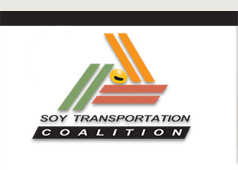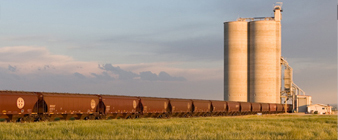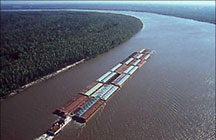 |
 |
|
| eNews • May 2013 | ||
| Promoting a Cost-Effective, Reliable and Competitive Transportation System |
||
 Senate approves Water Resources Development Act
Senate approves Water Resources Development Act
On May 15, the U.S. Senate passed its version of the Water Resources Development Act (WRDA) by an 83-14 roll-call vote. The Congressional Budget Office estimates the legislation would authorize $12.5 billion over the next ten years. The House of Representatives does not yet have a companion bill, but Congressman Bill Shuster (R-PA), Chairman of the House Transportation and Infrastructure Committee, has indicated that WRDA is a top priority this year.
The legislation was introduced and managed by Sens. Barbara Boxer (D-CA), and David Vitter (R-LA), chairman and ranking member, respectively, of the Senate Committee on Environment and Public Works.
“I am gratified by the overwhelming vote on final passage of our WRDA bill,” Boxer said. “Getting 83 votes in favor when bipartisanship is missing in the Senate is very important. Now is the time for the House to act so we can ensure that the benefits of the bill are realized.”
Significant components of the bill include:
1.) An effort to ensure all funds generated by the Harbor Maintenance Tax are used as originally intended – the dredging and maintenance of the nation’s ports and waterways.
The Harbor Maintenance Trust Fund was established in 1986 and is funded via a 0.125 percent tax on the value of imports and domestic cargo arriving at U.S. Ports with federally maintained harbors and channels. The tax collects approximately $1.8 billion annually. In establishing the Harbor Maintenance Trust Fund, there was an understanding that revenue generated from the tax would be spent on dredging and channel maintenance. Instead, about half is spent on such projects. The balance is spent on other discretionary projects that are unrelated to harbor maintenance.
The bill stipulates that, starting in 2014, the Army Corps of Engineers would have to spend at least $1 billion of funds collected by the Harbor Maintenance Tax on port projects. This would increase by $100 million each fiscal year until 2020, at which time 100 percent of the funds generated by the Harbor Maintenance Tax would be used for mandated purposes.
While there is a surplus of over $6 billion in the account, that money has already been spent. To regain that surplus or even to get 100 percent of the trust fund revenue in future years for harbor maintenance, as stipulated in the Senate bill, it would require a reduction in spending in other areas. The Senate bill has not identified those spending reductions.
2.) Obligating the federal government to assume 100 percent of the costs for the delayed and over budget Olmsted Lock and Dam project – located on the Ohio River near its confluence with the Mississippi River. Currently, the Inland Waterways Trust Fund – a fund financed via a $0.20 tax per gallon of diesel fuel consumed by the barge industry – pays for half the cost of the Olmsted project. Olmsted Lock and Dam had an original cost estimate of $775 million. The most recent cost estimate is $3.1 billion – a 400 percent cost overrun. By shifting the burden for funding the Olmsted project to the general treasury, approximately $750 - $1 billion of future Inland Waterways Trust Fund money will be freed up for other lock and dam projects. The Senate bill does not specify how the general treasury would pay for the increased financial obligation of the Olmsted project.
The bill also directs the Government Accountability Office to study the Olmsted project and identify causes for its cost overrun.
3.) Streamlining the permitting of inland waterway projects by mandating that the environmental agencies involved in the process agree to a timeline for either approving or disapproving a potential project. If those agencies (Environmental Protection Agency, for example) do not meet the timeline, they could face fines of up to $20,000 per day.
4.) The threshold for a major rehabilitation project to qualify for Inland Waterways Trust Fund matching funds would increase from $14 million to $20 million.
Because revenue generating measures must originate in the House of Representatives, the barge industry’s proposed increase in the Inland Waterways Tax of six to nine cents per gallon was not included in the Senate bill.
While Congress is obligated to pass a Water Resources Development Act every two years, the last WRDA passed in November 2007 in an over-ride of President George W. Bush's veto.
Soy Transportation Coalition |
|
